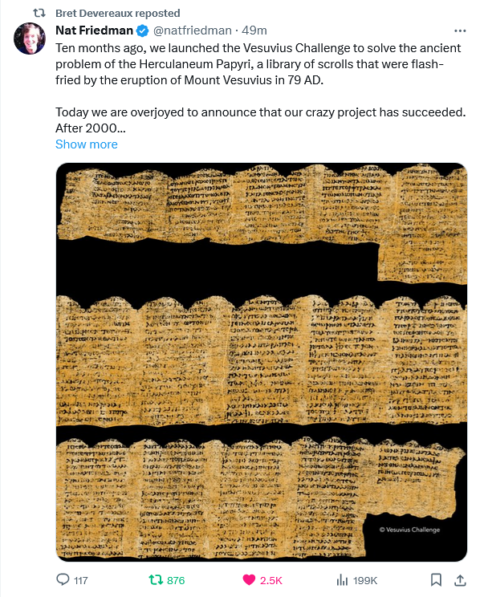Colby Cosh on the achievement of the three young researchers who were awarded the Vesuvius Challenge prize earlier this month, and what it might mean for classicists and other academics:
On Monday morning, Farritor and two other young Vesuvius Challenge notables, Youssef Nader and Julian Schillinger, were announced as winners of the grand prize. Nader and Schillinger had, like Farritor, already won Vesuvius Challenge prizes for smaller technical discoveries, and Nader had in fact been a mere heartbeat behind Farritor in producing the same “porphyras” from the same scan. After Farritor nabbed his US$40,000 “first letters” prize, the three decided to combine their efforts to net the big fish.
The result is a text that represents about five per cent of one of the thousands of scrolls recovered — and there may be more not yet recovered — from the Villa of the Papyri. The enormous villa was owned by an unknown Roman notable, but there are clues that one of its librarians was the Epicurean philosopher Philodemus of Gadara, who lived from around 110 to 35 BC. Until his identity was connected with the library, Philodemus did not receive too much attention even from classicists. But the Vesuvius Challenge efforts have now yielded fragments of what has to be an Epicurean text — one which discusses the delights of music and food, and condemns an unnamed adversary, possibly a Stoic, for failing to give a philosophical account of sensual pleasure.
The recovery of dozens more of the works of Philodemus would be — one might now say “will be” — a world-changing event for the classics. We know Philodemus was close to Calpurnius Piso (101-43 BC), the father-in-law of Julius Caesar and a likely owner of the doomed villa. He almost certainly had a front-row seat for the prelude to the end of the Roman Republic. We know he wrote works on religion, on natural philosophy and on history: even his thoughts on music and poetry would be of marked interest.
But nobody knows what else, what copies of older works, may be lurking in Philodemus’s library. At this moment antiquarians know the titles of dozens of lost plays by Aeschylus and Sophocles and Euripides and Aristophanes; we are missing major works of Aristotle and Euclid and Archimedes and Eratosthenes. We know that Sulla wrote his memoirs and that Cato the Elder wrote a seven-book history of Rome. Any of these old writings, or others of equal significance, may materialize suddenly out of oblivion now, thanks to the Vesuvius Challenge. It’s an impressive triumph for the idea of prize-giving as an approach to solving scientific problems, and the news release from the challenge offers a discussion of what the funding team got right and where the project will go next.




